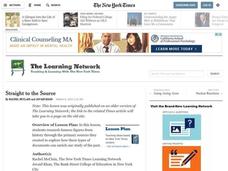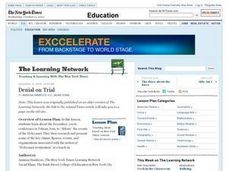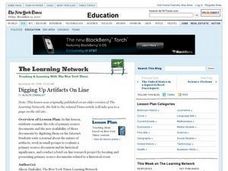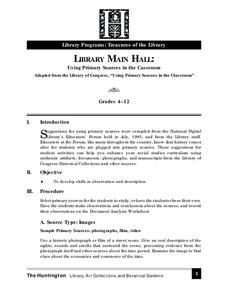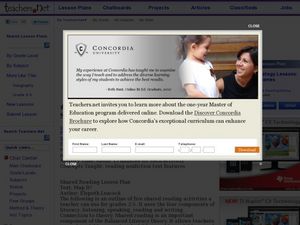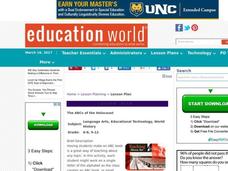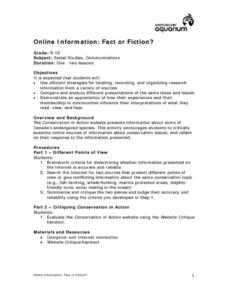Curated OER
Straight to the Source
Research famous figures from history through the primary sources they created! Explore how these types of documents can enrich our study of the past with your middle and high school learners. They create picture books to illustrate...
Curated OER
Caves
Explore caves with your class! Your scholars will participate in scientific observation, research, inference and deduction, reading, vocabulary, and writing activities about caves with this lesson plan. This resource contains five...
Curated OER
What Do You See at the Pond?
With What Do You See at the Pond?, young readers explore pond life and practice reading strategies. Learners first make predictions and then read the simple story independently. After a second read-through with a partner, kids come...
Curated OER
Denial on Trial
What is the "Faurisson Affair”? What is “Holocaust Revisionism”? What does freedom of speech entail? Do revisionists have a right to voice their ideas? Such questions are at the heart of a richly detailed, thought provoking lesson...
Curated OER
What a Relief!
How are disasters addressed by the Federal Government? This New York Times instructional activity, based on the article "Disaster Aid: The Mix of Mercy and Politics," prompts middle schoolers to discuss the idea of using a disaster...
Curated OER
Digging Up Artifacts On Line
Why is it important to preserve historical documents and artifacts? Examine the role of primary source documents and the availability of these documents on the Internet. Middle and high schoolers write a journal about the nature of...
Curated OER
Go for the Gold!
The options are vast with this Ancient Greece and Olympics research project! Using Scholastic online resources, historians have interactive and educational supports to guide them through researching and writing about the 2004 Olympics in...
Curated OER
Giant Smelly Plant Attracts Thousands
Read and discuss a news article about a rare corpse plant that bloomed in Washington D.C. Because this native Indonesian plant blooms so rarely, people flock to see it. After reading the article, your class answers comprehension...
Curated OER
Catch-22
During or after reading Catch-22, have your high school scholars complete this research project. First they'll brainstorm a list of people they might like to research, then they'll dive into your library's resources! There are...
Curated OER
Using Primary Sources in the Classroom
Scholars study a historical photograph to make predictions of what happened right after the picture was taken. They research a variety of different topics and use primary sources to answer questions about common food, fashion trends, and...
Curated OER
Writing Summaries
Practice summary writing with informational texts. Young readers create summaries after reading magazine articles, newspaper articles, or other forms of informational texts. Readers use the GRASP strategy (read text, write what you...
Curated OER
No Gun Ri, Korea
Students participate in a instructional activity conducting research about the Korean War. They investigate the different points of view that existed in the North and South of Korea. The concept is that there is two different points of...
Curated OER
Only the Facts
Practice the strategy of summarizing to gain meaning and knowledge from an informational text. Young readers highlight supporting details and main ideas, and then they use this to summarize two articles: "The Great Quake" and "What...
Curated OER
Using Social Studies in Five Shared Reading Lessons: Geography
After several short 15-minute mini-lessons, your learners will gain an understanding of the characteristics of a non-fiction text. Using the book Map It by Elspeth Leacock, your class will become acquainted with non-fiction terms...
Curated OER
The ABCs of the Holocaust
The ABC book format is used to organize information found in a Holocaust research project. Class members use the library and/or online resources to collect information and organize their findings under key terms, places, or names. Before...
Curated OER
Showdown on the Frontier
Especially critical following a series of shootings in schools, theaters, and religious buildings, it's safe to say that we need to evaluate the current laws on gun control. Eighth graders read a New York Times article in order to better...
Curated OER
Hispanic World - Spain
Take your class on an electronic field trip to Spain! Visit Cordoba or Barcelona, and run with the bulls (virtually) in Pamplona. Groups search the Internet to find sites that permit them to explore the original Spanish-speaking country....
Curated OER
Picture This
A unique writing lesson, this plan begins with learners talking about multiculturalism in small groups. Each learner will choose a picture from a newspaper, describe it to their small group, and think about how it relates to...
Curated OER
A Better Class of Journal-ists
Young academics create a current events journal by skimming newspapers for articles that fit defined guidelines for informational texts. After cutting out two articles each week to add to their journals, they write a brief description of...
Curated OER
My Community Book
Young learners examine different places in their neighborhood using informational texts. First they identify a place that they like to play and predict if it will be in the nonfiction book Community at Play.They will share their favorite...
PBS
Cardboard History
A PBS clip focused on collecting sports memorabilia launches this research project lesson. Class members then read Dan Gutman’s Honus and Me in which Wagner’s baseball card is used to time travel. The lesson ends with researchers...
Curated OER
Online Information: Fact or Fiction
Discuss ways to determine if the information middle and high schoolers gather online is accurate. Using the Internet, they cite two sources that show conflicting points of view on a subtopic of conservation. They summarize and analyze...
Curated OER
Sports Heroes and Private Action for the Common Good
Young readers explore philanthropy and its effects on the public good. They discuss athletes and their examples as philanthropists. They research a sports hero and play "The Match Game" to determine what they know about other sports...
Curated OER
Let's Get it Together! Reading to Learn
Let’s learn about frogs! Young readers are led through “Freaky Frogs,” a non-fiction article. Teach learners how to edit an article so there are fewer details to sift through. After talking through the article, they learn the six steps...
